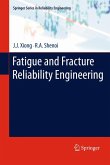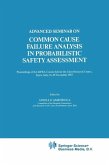Principles of Loads and Failure Mechanisms. Applications in Maintenance, Reliability and Design provides a complete overview of all relevant failure mechanisms, ranging from mechanical failures like fatigue and creep to corrosion and electric failures. Both qualitative and quantitative descriptions of the mechanisms and their governing loads enable a solid assessment of a system's reliability in a given or assumed operational context.
Moreover, a unique range of applications of this knowledge in the fields of maintenance, reliability and design are presented. The benefits of understanding the physics of failure are demonstrated for subjects like condition monitoring, predictive maintenance, prognostics and health management, failure analysis and reliability engineering. Finally, the role of these mechanisms in design processes and design for maintenance are illustrated.
Dieser Download kann aus rechtlichen Gründen nur mit Rechnungsadresse in A, B, BG, CY, CZ, D, DK, EW, E, FIN, F, GR, HR, H, IRL, I, LT, L, LR, M, NL, PL, P, R, S, SLO, SK ausgeliefert werden.









